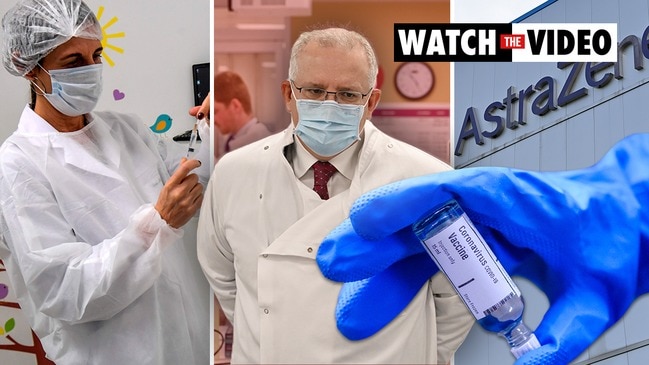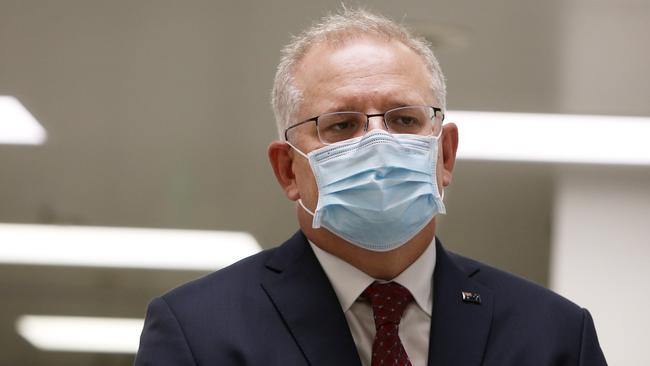Editorial: Virus jab may need to be mandatory
Early access to the vaccine being developed at Oxford is a positive step, but coming up with ways of ensuring the anti-vaxxers don’t eventually harm others could prove just as important, writes The Editor.

Opinion
Don't miss out on the headlines from Opinion. Followed categories will be added to My News.
It is heartening to hear that Australia has done a deal to secure supply of one of the leading COVID-19 vaccine candidates and that work is well under way to manage its rapid distribution.
It doesn’t take much imagination to picture the crisis that would ensue if a vaccine were to be available in other countries but not here or if there was no orchestrated plan to administer it en masse when it does finally arrive.
Prime Minister Scott Morrison’s announcement yesterday that the federal government had secured an arrangement with drug company AstraZeneca to ensure enough of its potential COVID-19 vaccine was available for all Australians demonstrated the concerted effort afoot to avoid such a disaster.
However, while Mr Morrison’s announcement was a ray of hope that this dreadful pandemic has an end, there is still some time to go before the vaccine being developed by Oxford University can be proved to be safe and effective.
No jab, no pay could apply to a COVID-19 vaccine
Free COVID vaccine for Australians when one is developed

The vaccine, called AZD1222, is in its third phase of trials and has prompted an immune response on healthy test subjects. But considerable work is still necessary to gauge how long it can protect people from contracting COVID-19.
“There is still much work to be done before we can confirm if our vaccine will help manage the COVID-19 pandemic,“ vaccine developer Sarah Gilbert said last month. “We still do not know how strong an immune response we need to provoke to effectively protect against SARS-CoV-2 infection.”
Still it is a step in the right direction for one of the more than 150 vaccines going through the various stages of development, which include another leading candidate from the University of Queensland that has begun human trials. Clearly, a strategy for obtaining and distributing the vaccine is vital and the vast majority of Australians will be eager to get a jab.
However, it is inevitable that a very tiny minority will question the mass dosing of the population and resist urgings from experts and the government to get themselves and their families inoculated.
Mr Morrison yesterday said he expected up to 95 per cent of Australians would get vaccinated, but he also mooted the prospect of making it mandatory, if required. “There are always exemptions for any vaccine on medical grounds, but that should be the only basis,” he said. “We are talking about a pandemic that has destroyed the global economy and taken the lives of hundreds of thousands all around the world.”
Just like governments across Australia have introduced laws that prevent families receiving tax benefits or accessing childcare unless their vaccinations are up to date, similar or possibly even more severe measures may be needed to end this pandemic.
Such a proposal may seem authoritarian and unnecessary.
However, if the initial vaccines are capable of only providing immunity for a certain period of time, there would be grave risk that lives could be lost in a second wave if some people don’t oblige.
It will take a considerable amount of co-ordination between all levels of government to ensure people can quickly gain access to the vaccine and there will need to be bipartisan agreement on what to do about those who refuse. Early access to the vaccine being developed at Oxford is a positive step, but coming up with ways of ensuring the anti-vaxxers don’t eventually harm others could prove just as important.
Footy’s big day for The Gabba
The race to secure a historic AFL grand final appears to have boiled down to a contest of who will blink first with restrictions on stadiums.
With Victoria’s MCG clearly not an option, the AFL is looking at Perth’s Optus Stadium or Brisbane’s Gabba as the venue for footy’s big day. Even the date is up in the air, with administrators considering October 17 or October 24.
Tellingly, West Australian Premier Mark McGowan has pushed back plans to ease his state’s restrictions, but landed on the 24th, which would allow the AFL to pull a crowd of 60,000 in Perth, rather than the current 30,000 capacity.
Meanwhile, the Gabba is restricted to 16,000 fans – 24,000 fewer than its capacity – and there is no specific date locked in as to when it may be lifted.
After being the primary driver of getting the AFL going again, it would be a huge slight if Queensland were to be overlooked. Hopefully, the Palaszczuk government can convince the AFL that a Gabba grand final is in the game’s best interest.
